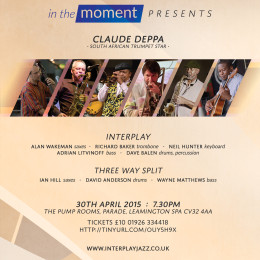International Jazz Day – Who Knew?

I’ve been talking to jazz musicians and promoters in the Midlands a lot recently in the build up to International Jazz Day 2015 and our concert with Claude Deppa, Interplay and Three Way Split on April 30th at the Pump Rooms, Leamington. I’m struck by how few of them have heard of IJD, let alone are preparing to play any part in it.
This could be a case of good old British scepticism about anyone who sets out to blow their own trumpet. If so I think this is misplaced, and risks letting an important opportunity go unanswered.
As I see it IJD is a fantastic development for jazz, a music that has been marginalised and neglected for decades. It allows us to present the case for jazz in a totally new light – with the full public endorsement of UNESCO, a global organisation committed to the advancement of culture and education worldwide. Let’s look at this in a few headlines:
- Herbie Hancock, one of the most enduring and undisputed creative artists of the last 50 years, has been appointed to UNESCO as Ambassador for Intercultural Dialogue. And he is a jazz musician – one of our own. How fantastic is that!
- Herbie has not only succeeded in persuading UNESCO to instigate International Jazz Day (in 2011) but he has brought the resources of the Thelonious Monk Institute of Jazz in behind it, to ensure that there is capacity to promote and coordinate IJD worldwide. Look at the Jazz Day website to see what I mean.
- IJD is totally inclusive. There are hundreds of events ranging from concert hall presentations to community festivals, workshops and broadcasts, many contemporary in content but also going right back to the Preservation Hall Jazz Band (in Oman!)
- In many places jazz is being celebrated alongside indigenous and traditional music, truly in the IJD spirit of promoting intercultural dialogue and mutual understanding, and fostering international cooperation and communication.
All this suggests to me that for at least one day a year the jazz world is setting the cultural agenda, not fighting for a place on it, and I love it.
We know that jazz in the UK is under-exposed, under-resourced and poorly understood by many people and institutions. Despite that it survives, and some might say flourishes, as a music of persistence, of resistance against the homogenisation of culture, and the assertion of every individual’s right to be heard in their own way.
Many people find they like jazz more than they thought, as and when they come into contact with it. And this is the point about IJD for me. It is our opportunity to claim the attention of a much wider public, present a united front, experience some solidarity instead of market competition, and persuade thousands of people that this wonderful way of making music really has something to offer them, as audiences and as performers.
Let’s get to it!



